The Cross of Christ and the Politics of Jesus
 Sunday, December 13, 2015 at 8:11PM
Sunday, December 13, 2015 at 8:11PM
The believer's cross is no longer any and every kind of suffering, sickness, or tension, the bearing of which is demanded. The believer's cross must be, like his Lord's, the price of his social nonconformity. It is not, like sickness or catastrophe, an inexplicable, unpredictable suffering; it is the end of the path freely chosen after counting the cost. It is not, like Luther's or Thomas Muntzer's or Zinzendorf's or Kierkegaard's cross, an inward wrestling of the sensitive soul with self and sin; it is the social reality of representing in an unwilling world the Order to come.
World Economic Forum 2015 - day 2
 Thursday, June 4, 2015 at 3:37PM
Thursday, June 4, 2015 at 3:37PM 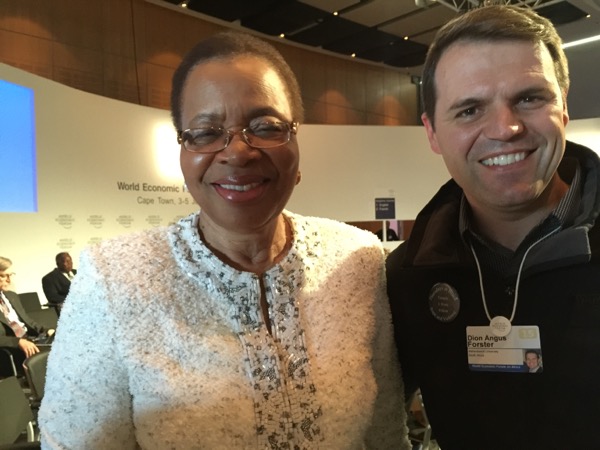
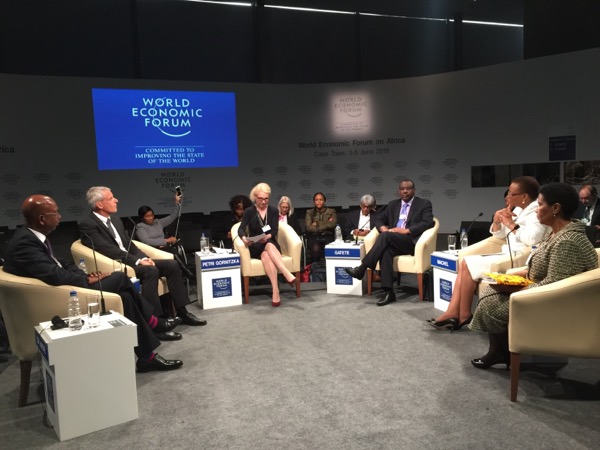
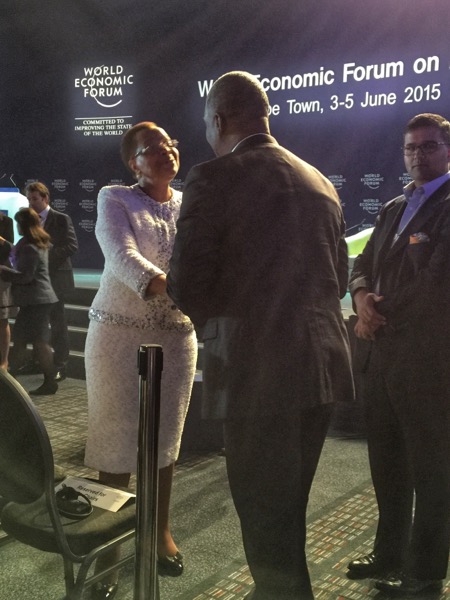
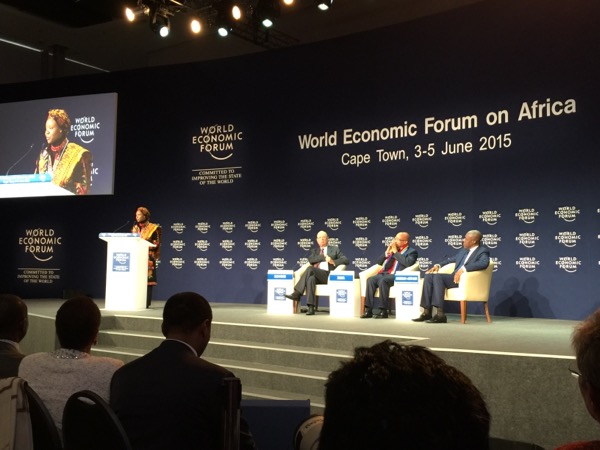 Today is the 2nd day of the World Economic Forum regional meeting in Cape Town, South Africa.
Today is the 2nd day of the World Economic Forum regional meeting in Cape Town, South Africa.
I only got into the CTICC just after 9am because I had to do a short radio interview at 8.15. Thankfully the rain has let up! So driving in was a little better on my motorcycle. As an aside, it must be one of the best ways to travel! I managed to park just across the road from the CTICC, whereas the drivers of cars first had to have their cars screened and cleared by a security team before they could enter the parking lot. In large measure this has to do with the number of foreign dignitaries, who are attending the forum, as well as the fact that Mr Jacob Zuma, the President of South Africa, spoke this morning. I attended the Panel discussion at which Mr Zuma spoke. Just a few minutes before that session he and the security entourage passed right past me. I was asked to stand still for a few moments as they passed. Then, as I was about to enter the venue of the presentation I saw my friend Archbishop Thabo Makgoba waiting to enter the venue. We talked for a while and then sat together in the hall. It was wonderful to see him being greeted by so many of the important and significant dignitaries, especially Mrs Graca Machel (see the attached photograph).
I was also grateful to have an opportunity to meet Mrs Machel and tell her about the research that I am doing on her for the American Academy of Religion. She was very kind! I even managed to get a photograph with her when I attended the panel discussion on bridging the gap between male and female economic inequality.
She is doing such amazing work to bring gender equality in society. It is a sad fact that women are most often the primary carers in the home and in society, they earn less than their male counterparts and get less access to the formal economy. On the whole women work harder and get less than men! While many countries and companies work for 'political' equality (representation in policy and decision-making positions). However this is not matched in wages, division of labour and human rights. The issue that should drive this agenda is justice and equality, not tokenism. The ethics of care is a reminder that care is not linked to only one gender. Women often get trapped in unpaid care that locks them to the home. Men work and so get economic independence, status and even the stimulus and recognition for their efforts. So simply put, let's distribute care and the division of labour in the home more equitably, and let's educate, lobby, and work for equal rights, opportunities and economic opportunities for both women and men.
One of the most interesting parts of the day was in the earlier panel discussion on Africa (the plenary session) when Anton du Plessis (from the Institute for Security Studies asked a question about security, good governance and corruption - I managed to record the response of Mr Zuma, it is in Apple voice recorder format (.m4a) and about 2MP.
You can download it from here.
He was clearly in the hot seat! His response was vague and tried to avoid the local context and his own challenges in South Africa. As I listened to conversations after that session it was clear that person's from all over the world were aware of this embarrassement!
In the broader discourse of the day, a great deal of the discussion on the morning has been about the development of Africa's youthful population. A few interesting statistics are that by 2040, 50% of the world's Youth will be African, and that there is a need to create 80 million jobs a year for African school leavers (for all of us to be employed). There was an emphasis on the fact that we need to train young Africans to be much more entrepreneurial, and also that education in Africa, while being widespread (about 90% of Africans get access to some form or level of education), is often not preparing young people for work or work creation.
I also attended a session on water security - it was shocking to be reminded that the World Economic Forum lists water security as the single largest challenge we face in the world today! Statistically the WEF shows that demand will be 40% higher than what the earth is able to supply by 2050! We are heading for a serious water crisis. What is needed is for us to change the way in which we use water, demand and supply are a huge problem. Wastage is another problem - it was reported that just 8 municipalities in South Africa account for 90% of wasted water, costing us 7 Billion Rand per annum! That is shocking! Lastly, we need technology and partnerships to manage water use policy and water supply and delivery.
As a Christian I am thinking how can we use this precious resource more justly? The reality is that people like myself can afford clean and reliable water, but the poor cannot! They suffer most when water is scarce. I will be attending a few more sessions during the day and will upload more reflections and thoughts as the day progresses.
World Economic Forum - day 2
 Thursday, June 4, 2015 at 1:00PM
Thursday, June 4, 2015 at 1:00PM 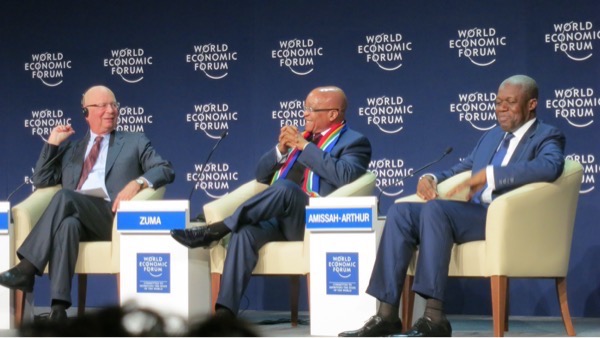
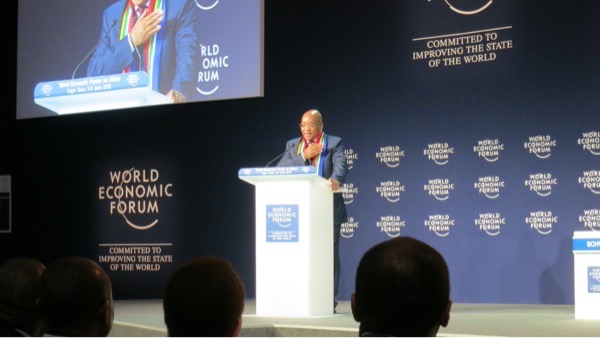
Please follow this link for an updated post with reflection on further sessions on gender equality, water security and the development challenges.
Today is the 2nd day of the World Economic Forum regional meeting in Cape Town, South Africa. I only got into the CTICC just after 9am because I had to do a short radio interview at 8.15. Thankfully the rain has let up! So driving in was a little better on my motorcycle. As an aside, it must be one of the best ways to travel! I managed to park just across the road from the CTICC, whereas the drivers of cars first had to have their cars screened and cleared by a security team before they could enter the parking lot. In large measure this has to do with the number of foreign dignitaries, who are attending the forum, as well as the fact that Mr Jacob Zuma, the President of South Africa, spoke this morning. I attended the Panel discussion at which Mr Zuma spoke. Just a few minutes before that session he and the security entourage passed right past me. I was asked to stand still for a few moments as they passed. Then, as I was about to enter the venue of the presentation I saw my friend Archbishop Thabo Makgoba waiting to enter the venue. We talked for a while and then sat together in the hall. It was wonderful to see him being greeted by so many of the important and significant dignitaries, especially Mrs Graca Machel.
I was also grateful to have an opportunity to meet Mrs Machel and tell her about the research that I am doing on her for the American Academy of Religion. She was very kind! One of the most interesting parts of the panel discussion was when Anton du Plessis (from the Institute for Security Studies asked a question about security, good governance and corruption - I managed to record the response of Mr Zuma, it is in Apple voice recorder format (.m4a) and about 2MP.
You can download it from here.
A great deal of the discussion on the morning has been about the development of Africa's youthful population. A few interesting statistics are that by 2040, 50% of the world's Youth will be African, and that there is a need to create 80 million jobs a year for African school leavers (for all of us to be employed). There was an emphasis on the fact that we need to train young Africans to be much more entrepreneurial, and also that education in Africa, while being widespread (about 90% of Africans get access to some form or level of education), is often not preparing young people for work or work creation.
I will be attending a few more sessions during the day and will upload more reflections and thoughts as the day progresses. Please follow this link for an updated post with reflection on further sessions on gender equality, water security and the development challenges.
A chapter published in 'Restorative Readings The Old Testament, Ethics, and Human Dignity'
 Monday, May 25, 2015 at 2:26PM
Monday, May 25, 2015 at 2:26PM 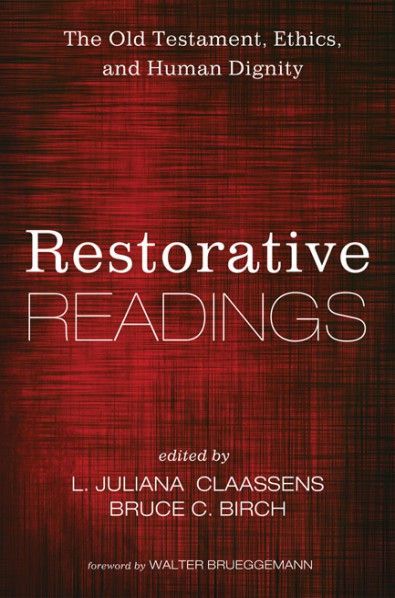 A new book for which I wrote a section has been published! The book is called ‘Restorative Readings: The Old Testament, Ethics and Human Dignity’. It was edited by two wonderful friends, Professors Julie Claassens and Bruce Birch. This is a magnificent collection of chapters on issues related to reading the Old Testament text within the context of issues related to Christian Ethics and the Human Dignity discourse.
A new book for which I wrote a section has been published! The book is called ‘Restorative Readings: The Old Testament, Ethics and Human Dignity’. It was edited by two wonderful friends, Professors Julie Claassens and Bruce Birch. This is a magnificent collection of chapters on issues related to reading the Old Testament text within the context of issues related to Christian Ethics and the Human Dignity discourse.
You can order your copy of the book here (Wipf and Stock), or from Amazon.com here.
Congratulations Juile and Bruce! This is such an important book! I have read the chapters a number of times and am so excited about the voices that will be added to the discourse.
The foreword was written by Walter Brueggemann.
Here is some additional information about the book:
The Bible has the unfortunate legacy of being associated with gross human rights violations as evident in the scriptural justification of apartheid in South Africa as well as slavery in the American South. What is more, the Hebrew Bible also contains numerous instances in which the worth or dignity of the female characters are threatened, violated or potentially violated, creating a situation of dehumanization in which women are viewed as less than fully human.
And yet the Bible continues to serve as a source of inspiration for readers committed to justice and liberation for all. But in order for the Bible to speak a liberative word, what is necessary is to cultivate liberating Bible reading practices rooted in justice and compassion. Restorative Readings seeks to do exactly this when the authors in their respective readings seek to cultivate Bible reading practices that are committed to restoring the dignity of those whose dignity has been violated by means of racial, gender, and sexual discrimination, by the atrocities of apartheid, by the HIV/AIDS pandemic, and by the dehumanizing reality of unemployment and poverty.
Wow! So I will be attending the World Economic Forum on Africa next month!
 Sunday, May 10, 2015 at 8:46PM
Sunday, May 10, 2015 at 8:46PM I am not quite sure what 'qualified' me to be invited to participate in the World Economic Forum on Africa that is to be held in Cape Town next month (3-5 June 2015)? However, I am grateful and a little nervous to attend!
I was sent an invitation once before (about a year ago), but was not able to take up the invitation at that time. I felt then, as I do now, that there were others who could serve better in that realm and so I suggested that they invite some other South African academics and business leaders that I have worked with. Sadly the invitation is not transferable. So I thought that was it!
But recently I received another invitation to next months meetings. After checking with my HOD and our Dean if I could be released to go (which they enthusiastically agreed upon!) I completed my registration and received a confirmation of attendance on the same day!
I am not entirely sure what the 3 day meeting will entail. However, I am excited to participate and look forward to learning and bringing a perspective on economics that is shaped by the common good, informed from the ethics of my Christian faith. I have done some work in recent years on economics and justice, written a book and a number of articles on issues such as poverty, inequality, corruption and suffering, but also on faith and work and the responsible purpose of wealth.
I would appreciate your prayers.
You can read about the meetings here:
http://www.weforum.org/events/world-economic-forum-africa-2015
I will post information and details here as I receive them.
What hope is there for South Africa? A public theological reflection on the role of the church as a bearer of hope for the future
 Wednesday, May 6, 2015 at 12:11PM
Wednesday, May 6, 2015 at 12:11PM I discovered today that an article I had written some time ago had been published and made available to the public from the Theological Journal, HTS.
The details for the article are:
Title: What hope is there for South Africa? A public theological reflection on the role of the church as a bearer of hope for the future
Please follow this link to download a copy from the Journal website: http://www.hts.org.za/index.php/HTS/article/view/2814
Abstract:
What hope is there for South Africa? What role can the church play as a bearer of hope in South Africa? This article seeks to address these important questions. Firstly, it problematises the contemporary notion of hope in South Africa by showing that it is a complex theological and social concept. Next, a nuanced understanding of hope is presented by adopting a public theological methodology that brings dominant theological perspectives on eschatological hope into dialogue with the most recent statistics about the quality of life in South Africa from 1994, 2004 and 2014. The article proposes that the complexity of Christian hope necessitates an understanding of the present reality that is held in dynamic tension with the desired future – namely a present-futurist eschatology. Finally the article shows that from this vantage point the church, in its various forms and understandings, is able to be a bearer of Christian hope that can contribute towards shaping a better future for South Africa.
Reference:
If you have a chance (and the stamina!) to read it I would appreciate feedback and comments. There is an itneresting set of statistical data on living conditions in South Africa.
Robots are starting to break the law and nobody knows what to do about it
 Saturday, January 3, 2015 at 1:22PM
Saturday, January 3, 2015 at 1:22PM 
More than 10 years ago I wrote about this challenge in my doctoral research. At the time it was not yet feasible, but as the story at this link shows, robots can now commit crimes (or at least perform actions that we would consider criminal).
http://fusion.net/story/35883/robots-are-starting-to-break-the-law-and-nobody-knows-what-to-do-about-it/?utm_source=digg&utm_medium=email
The issue that the referenced article doesn't consider is whether the acts are actually criminal. Did the robot have criminal intent or was it just randomized action on the part of a non-conscious machine? While we may consider these actions criminal I doubt the robot had any sense of the difference between the 'criminal purchases' and other randomized 'non-criminal' purchases.
Still, it highlights an interesting ethical issue, what do we do when criminal activities take place by non sentient, self directed, machines or programs? Perhaps at best we could deactivate the machine and aggregate its code or re-program it with more sophisticated coding that takes our sense of criminal activity into account. In more serious cases we could ask whether the creators of the machine or program had criminal intent and pursue them for their intent and action (enacted by proxy through the machine or program).
You can read more about my thoughts and research on these issues (although I did shift from Artificial Intelligence to Neuroscience):
http://www.dionforster.com/blog/tag/neuroscience
This article in Sci-WEB used some of my Artificial Intelligence research:
http://www.dionforster.com/blog/2010/4/14/sci-fi-meets-society-my-artificial-intelligence-research-use.html
Exposed - a new global Christian campaign against corruption
 Friday, December 9, 2011 at 12:12PM
Friday, December 9, 2011 at 12:12PM  Today is international anti-corruption day.
Today is international anti-corruption day.
The cost of corruption amounts to trillions of dollars each year. Most frequently it is the poorest of the poor who suffer the weight of this abuse.
As Christians we have a responsibility to act against injustice and abuse (Micah 6.8).
Please see this new campaign to fight global corruption - it is called Exposed.
The excerpt below is taken from the Unashamedly Ethical website, one of the Exposed campaign partners:
Christians around the world will raise their voices together in a united response against corruption in 2013.
EXPOSED – Shining a Light on Corruption - 14-20 October 2013
We aim to challenge the global Church, business and governments. Every year well over US$1 TRILLION goes missing through mismanagement, illicit business practices and poor governance. It doesn't have to be this way.
POOR: This money doesn’t just evaporate - it is actually deducted from the livelihood of some of the poorest people in the world.
BRIBES: In September 2005 a Transparency International report showed that poor women in some parts of the world may have to pay an average of US$22 in bribes for maternal services when having their babies.
DESTITUTION: As Dr Goodwill Shana, chair of heads of denominations in Zimbabwe, put it: “While corruption is present everywhere from the boardrooms of corporations in developed countries to the dusty streets of Africa, in Africa it plays a far more significant role in keeping the poor in the unrelenting grip of destitution.”
OPPRESSION: Corruption is one of the greatest obstacles to dealing with extreme poverty and the campaign aims to mobilise Christians to join with wider society in exposing the practices which oppress the poor.
PROMISES TO THE POOR: Corinne Woods, director for the United Nations Millennium Development Programme, is enthusiastic about the campaign: "Every individual has a part to play in combating the corruption which erodes the promises of the millennium declaration. If we are to reach these goals in 2015 and respond to extreme poverty beyond we really do need to tackle corruption wherever it exists. I am so pleased that EXPOSED is picking up this challenge."
WHO ARE WE? EXPOSED is a coalition of Christian organisations.
The campaign is currently hosted by a group of Christian organisations including Bible Society of UK and North America, Salvation Army, Unashamedly Ethical and Micah Challenge International.REDEMPTION: “Our job is to provide a forum in which 100 million Christians will remind ourselves and the world of God’s passion for the poor.” said Rev Joel Edwards, chair of the steering group.
“We are also excited about the growing interest from a wide range of churches and organisations who are passionate about this issue. EXPOSED is not about aggressive protest for its own sake. We want to shine a light in order to bring hope and redemption and we hope to bring examples of good practise as well as offer robust challenges to institutions which oppress the poor.”
Is God a heretic?
 Thursday, October 7, 2010 at 9:35PM
Thursday, October 7, 2010 at 9:35PM In Mark 2.13-17 to we read one of the many accounts in the Gospels where Jesus was judged by the Pharisees for fraternizing with sinners.
There is little doubt that the religious establishment of his day thought that Jesus was a heretic!
I was reminded of this today as I was speaking to a friend about one of my little books 'Christ at the centre - discovering the cosmic Christ in the spirituality of Bede Griffiths'. We were remarking how different Fr Bede's Christology was from that of his friend CS Lewis. In fact, Fr Bede's theology developed in a very different way to CS Lewis' - I think that it may be because each of the men honoured the context in which they served Christ. Lewis formed his faith in the University City of Oxford, while Griffiths formed his faith as a missionary monk in Southern India. Both were committed to Jesus, yet that commitment found expression in quite different ways.
I was milling over our conversation as I was driving to a meeting at the University of Stellenbosch (where I was to give input into a new Master's degree for ministry practitioners). My thoughts turned to two rather strange questions:
1) I wonder how the contemporary Church would 'judge' God's radically gracious theology?
2) Would we, like the pharisees of Jesus' time, consider God to be heretic?
Here's a video I recorded while driving.
In the December 2008 volume of the Journal STUDIA HISTORIAE ECCLESIASTICAE I did a review on Richard Burridge's wonderful book 'Imitating Jesus: An inclusive approach to New Testament ethics' - Burridge makes an interesting point in his book, one that I tend to agree with. He notes that if we read the words of Jesus (his teaching) we will see that he had a rather stringent ethic, a high set of moral standards. Yet if we observe the actions of Jesus we will find that he acts far more graciously. It is not a matter of incongruence, or cognitive dissonance, rather it is that the teaching of 'the law' finds it's fullest expression in a life of loving grace.
Perhaps the contemporary Church, and many Christians, have become too caught up in the stringency of 'the law' and have not held on to a lifestyle of loving grace.
Perhaps we would consider God to be unorthodox, maybe even a heretic? What do you think?
As for me, I am trying to be a little more like Jesus every day! I want His love for this world to run through my speech, my thoughts and my actions. Some may find the company that I keep difficult to bear, the may even call me unorthodox, perhaps even a heretic!
The predictable irrationality of ethics - why we find it more difficult to steal money
 Friday, October 1, 2010 at 9:08AM
Friday, October 1, 2010 at 9:08AM  I read Dan Ariely's fascinating book 'Predictably Irrational' last month. It gave me a great deal of insight into how we make irrational decisions, but more importantly how we can understand (and perhaps even predict) such blunders.
I read Dan Ariely's fascinating book 'Predictably Irrational' last month. It gave me a great deal of insight into how we make irrational decisions, but more importantly how we can understand (and perhaps even predict) such blunders.
In chapters 11 and 12 of the book Ariely deals with the matter of ethics and morals. He shows through a series of experiments how we make unethical decisions because of the way in which our brains value different things of the same value... Perhaps you should read that sentence again?
 Simply stated, let's say a Coke costs US$1, what is more valuable to us, the Coke or a US$1 bill? Well, he conducted an experiment where he placed 6 Cokes in some University dormitory fridges, and a plate of 6 US$1 bills in other fridges. After 72 hours he returned to see which of the items (the money or the cokes) were stolen more easily.
Simply stated, let's say a Coke costs US$1, what is more valuable to us, the Coke or a US$1 bill? Well, he conducted an experiment where he placed 6 Cokes in some University dormitory fridges, and a plate of 6 US$1 bills in other fridges. After 72 hours he returned to see which of the items (the money or the cokes) were stolen more easily.
It is not surprising that he discovered that in almost all the cases the Cokes were gone, but the plate of money was untouched in almost every case.
In short this experiment (and a few others that he uses to verify his assumption) shows that people are less likely to 'steal money' than 'steal coke' - why? Well, there seems to be a far greater social stigma attached to taking cash than there is to taking objects.
 Here's another example. Let's say you're at work and your wife phones you and tells you that your child needs a pencil for school. Would you feel OK -> Not too bad -> Too guilty to take a pencil home for her? Most people answered that they would feel OK to take a pencil home.
Here's another example. Let's say you're at work and your wife phones you and tells you that your child needs a pencil for school. Would you feel OK -> Not too bad -> Too guilty to take a pencil home for her? Most people answered that they would feel OK to take a pencil home.
Now, let's say that there are no pencils at work, but there is a shop downstairs that sells pencils for 60cents. The company's pettycash box is in your possession and no one is checking. How would you feel about taking 60cents from the pettycash box to buy a pencil for your daughter (the value of the pencil you would have taken from your company is 60cents)?
 Most people indicated that it would be much more difficult to steal the money than it would be to steal the pencil from their employer...
Most people indicated that it would be much more difficult to steal the money than it would be to steal the pencil from their employer...
Why? Well, we have been socialized to think that money is 'worth more' than goods or time! People go to jail for stealing money, but we seldom hear about people going to jail for 'stealing a pencil', or 'stealing time', or 'stealing private phone calls' from work...
I was fascinated by this (predictably) irrational element to my own ethical decision making. What do you think? Is Ariely's interpretation of his findings correct? Is the value of goods and time the same as the value of money?
The Bible and Christian Ethics - lectures at the University of Stellenbosch
 Thursday, September 30, 2010 at 1:30PM
Thursday, September 30, 2010 at 1:30PM This week I had the privelage of teaching at the University of Stellenbosch on two days. The topic of the lectures was Scripture and Ethics.
The Bible is a critical source that informs our moral and ethical decision making processes, and helps us to justify why we have taken a particular course of action. My lectures were based on two chapters that I have written.
“Reading the same Bible and reaching different ethical conclusions: The Bible and Christian ethics" by Forster, D (2009:131-156) in What is a good life? An introduction to Christian Ethics in 21st century Africa. Kretzschmar, L; Bentley, W; van Niekerk, A (eds). Kempton Park, AcadSA Publishers.
And,
"Why you can't simply trust everything you read" by Forster, D (2008:25-46) in What are we thinking? Reflections on Church and Society from Southern African Methodists. Forster, D; Bentley, W (eds). Cape Town. Methodist Publishing House.
When we need the Bible most... Complex ethical dilemmas and Christian scripture
Sadly, the Bible is often abused in moral and ethical decision-making processes. I often hear people quoting a single verse to justify a stance on something (whether it be politics, sexual choices, wealth etc.) An overly simplistic approach to ethics and an ignorant application of the scriptures can be extremely hurtful and damaging in complex ethical decisions.
In this set of lectures we began by examining the complexity of ethical decision-making. We used a story that a student shared with me when I was still a lecturer in Ethics and Systematic Theology at the University of South Africa (UNISA) some years ago:
Moral problems tend to have straigthfoward answers (right or wrong), whereas ethical dilemmas seem to have a mix of both good and bad. No matter what choice you make it will not be entirely good or entirely bad. The complexity is to work out what decision is best under the circumstances. This process of deciding is often complicated when one asks the question 'What would God want me to do in this situation?', or 'What does the Bible say I can and cannot do in this situation?'
The example used in class came from a student that I taught at UNISA.
Example: Is it ever right for a son to have sexual intercourse with his mother? What does the Bible say? The answer is, no, it is not acceptable for a son to have sexual intercourse with his mother. The Bible will not allow that. This is a clear moral problem. It is easy to resolve since the choices are either right or wrong, good or bad.
However, in this instances the young man was at home with his mother. A gang of thugs burst into their home, stole various items and then held a gun to the young man’s mother’s head. The told him that if he did not have sex with his mother they would kill her. What should he do? Does the Bible make some allowance for him to break a law on sexual purity because the value of his mother’s life is more important in Biblical terms?
This last point is an ethical dilemma. There is a conflict of values – the value of sexual purity in conflict with the value for life. Which is more important in Christian ethics? How does one use the Bible to inform such an ethical decision making process and choice?
Well, here are the slides from the lectures. You can download the original Microsoft Powerpoint slides from this link (5MB). These slides have notes and references in them.
However, if you simply want to click through the slides then please use the slideshare window below.
In order to illustrate the complexity of using the Bible in Christian ethics we used a very contentious subject, the Christian (Biblical) perspective on persons with a same sex orientation, and in particular persons in an active homosexual relationship, to consider an approach to ethical decision-making.
I would highly recomend that you read the chapters referenced above. They give a detailed technical outline of both the content of the lecture, but also the Analyse, Ask, Evaluate and Act model that is presented here.


